|
|
|
Sort Order |
|
|
|
Items / Page
|
|
|
|
|
|
|
| Srl | Item |
| 1 |
ID:
153577
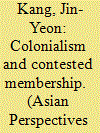

|
|
|
|
|
| Summary/Abstract |
In this article I address explanations of postcolonial state formation in Korea. Focusing on the impact of Japanese colonial legacies on Korea in the early period of US occupation, I examine how the historical experience of colonial rule reformulated people's perception of collective membership in the national community, thereby conditioning and shaping Korea's postcolonial division. I pay particular attention to the historically shifting nature of collective identity and sense of belonging. My argument is that the significance of colonialism lies not merely in its institutional reproduction but especially in relational changes of the indigenous people and in reconstructing the meaning of nation and political community.
|
|
|
|
|
|
|
|
|
|
|
|
|
|
|
|
| 2 |
ID:
187169
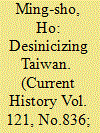

|
|
|
|
|
| Summary/Abstract |
As the Taiwanese people’s pride in their tolerant, inclusive democracy has grown, they have become less inclined to identify as Chinese, or to consider their island homeland as a part of China.
|
|
|
|
|
|
|
|
|
|
|
|
|
|
|
|
| 3 |
ID:
171636


|
|
|
|
|
| Summary/Abstract |
Some scholars have argued that anti-Korean oppression is disappearing from Japanese society, and that race is irrelevant to the current condition of Zainichi Koreans, Japan’s disenfranchised postcolonial minority. In contrast to these views, this article builds on racial formation theory to retrace the historical development of racism in Japan, and to reveal its continuing impact on the lives of Zainichi Koreans. It remarks that Zainichi Koreans have reacted to oppression in various ways, forging new identities and resisting using the means available to them. But it also contends that the persistence of discriminations and inequalities, as well as the recent rise of ultranationalist groups like Zaitokukai, are proofs of the ongoing marginalization and persecution of Koreans in Japan.
|
|
|
|
|
|
|
|
|
|
|
|
|
|
|
|
| 4 |
ID:
095331
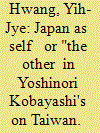

|
|
|
|
|
| Publication |
2010.
|
| Summary/Abstract |
This article is an attempt to demonstrate how and through which social practices Taiwan's past colonial experiences have been discursively produced in a certain way and what other alternatives have been excluded from this process. The article scrutinizes the controversy surrounding a Japanese manga On Taiwan, a book that provides a very positive evaluation of the legacy of Japanese colonialism in Taiwan. Through analyzing statements, utterances, and conducts concerning this manga that were produced by those who have various positions, this article aims to comprehend how the discourses of Japanese colonialism and Sino-chauvinism reciprocally conflict and compete with each other in ways that affect people's self-identification, producing a particular form of subjectivity of Taiwan, while excluding, repressing, and silencing other alternatives.
|
|
|
|
|
|
|
|
|
|
|
|
|
|
|
|
| 5 |
ID:
123492
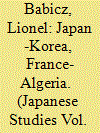

|
|
|
|
|
| Publication |
2013.
|
| Summary/Abstract |
This article compares the colonial situations, decolonisation processes and post-colonial relations of two former colonial 'couples', Japan-Korea and France-Algeria. Japan's modern history until 1945 was not only a history of war, but also of colonialism. The Japanese modern takeover of Korea was a colonial enterprise, and Japanese colonialism in Korea was motivated by ideas partly similar to the policy implemented by the French in Algeria. Both Korea and Algeria were an integral part of the coloniser's national territory, and the fate of the two provinces was to be total assimilation. The processes of reconciliation that have taken place since liberation are also best understood within a decolonisation paradigm. While the respective relationships are dictated by specific geopolitical factors and policy choices, the colonial past is casting a similar shadow on both the former colonisers and their former victims.
|
|
|
|
|
|
|
|
|
|
|
|
|
|
|
|
| 6 |
ID:
046589
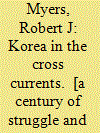

|
|
|
|
|
| Publication |
Hampshire, Palgrave, 2001.
|
| Description |
vii, 200p.hbk
|
| Standard Number |
0312238150
|
|
|
|
|
|
|
|
|
|
|
|
Copies: C:1/I:0,R:0,Q:0
Circulation
| Accession# | Call# | Current Location | Status | Policy | Location |
| 045072 | 951.904/MYE 045072 | Main | On Shelf | General | |
|
|
|
|
| 7 |
ID:
139446


|
|
|
|
|
| Summary/Abstract |
This article examines whether writing histories of colonial subjects is possible. Traditional colonial histories subsume the colonial subject's individual history under a larger narrative of subjugation, which often does not allow room for people to exist outside the dichotomized role of collaborator/resister. This approach has left a gap in the scholarship for histories of colonial subjects whose lives do not easily fit either category. This article addresses this gap by detailing the life of Yayutz Bleyh, an Atayal woman who became one of the most important participants in the Japanese colonial administration of Aboriginal Affairs in Taiwan. For over six years, the author gathered fragmented pieces of information regarding Yayutz from a multitude of sources – visuals, as well as oral and written materials from inside and outside the colonial archive – in order to sketch the contours of an extraordinary woman and her life. Through the process of filtering these disparate sources, it was the silences regarding certain issues and the discrepancies that emerged among sources that proved to be the most revealing about Yayutz as someone who straddled both the world of the colonizer and the colonized.
|
|
|
|
|
|
|
|
|
|
|
|
|
|
|
|
| 8 |
ID:
086738


|
|
|
|
|
| Publication |
2009.
|
| Summary/Abstract |
Although alien rule is widely assumed to be illegitimate, nationalist resistance to it varies across time and space. This article explores why there was greater nationalist resistance to Japanese colonial rule in Korea than Taiwan from the turn of the twentieth century to the end of World War II. Resistance to alien rulers requires both a supply of participants in nationalist collective action and a demand for national self-determination. The article assesses two principal propositions: (1) that the supply of participants increases to the degree that native elites are stripped of their traditional authority and offered few incentives to collaborate; and (2) that the demand for national self-determination decreases to the degree that alien rule is fair and effective. A comparative analysis of the effects of Japanese alien rule in Taiwan and Korea suggests that nationalist resistance is greater in the earliest phases of occupation, that the greater native elites' opportunities, the weaker the resistance to alien rule; and that the fairer the governance, the weaker the resistance to alien rule.
|
|
|
|
|
|
|
|
|
|
|
|
|
|
|
|
| 9 |
ID:
080297


|
|
|
|
|
| Publication |
2007.
|
| Summary/Abstract |
Asia has two "third-wave" democracies, Taiwan and South Korea.
Historically and in their democratizations both countries share several features. Both
had a Japanese colonial experience. The economies of both grew rapidly under
authoritarian governments and both democratized at similar times. Both democratic
regimes have faced issues of legitimacy, media that derive from the old authoritarian
regimes, and judicial authorities that have been slow to democratize. However,
Taiwan and South Korea also differ in several important respects. For example,
Taiwan has some continuity of political parties, while in South Korea parties have
become the electoral machines of leading politicians. Taiwan and South Korea
today both have divided polities, but democratization has achieved widespread
acceptance in both countries and very few people wish to return to an authoritarian
past.
|
|
|
|
|
|
|
|
|
|
|
|
|
|
|
|
|
|
|
|
|